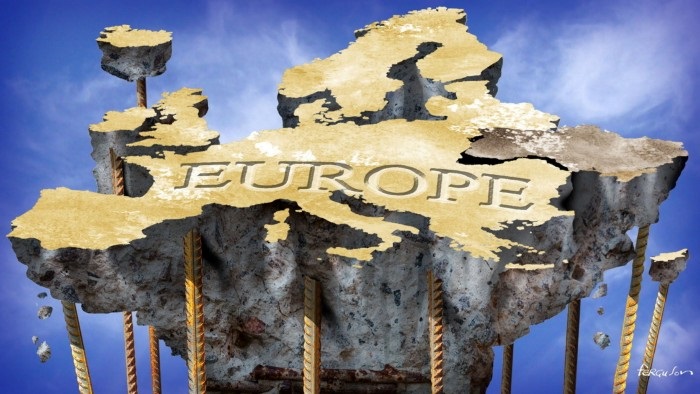 Pic.: ‘Financial Times’
Pic.: ‘Financial Times’
The European Union faces structural challenges.
A continent historically never united without force of arms or conquest, it corporately desires to be an empire vicariously through America. It is unable to implement any order without American power and generosity, while often sanctimoniously lecturing America about morality, even when those values appear to be increasingly frayed, open to interpretation, and unenforceable, writes ‘The American Conservative’. There is no Caesar, Charlamagne, Napoleon, or Hitler waiting in the wings. No individual country in Europe is capable of achieving martial hegemony over the entire continent, unlike America in 1945 and again in 1989.
The European Union is an artificial construct, and European peace is purely a second-order side-effect of American hegemony. American reactionaries fail to understand that the dormant divisions within Europe are constitutional, not simply intra-racial but intra-ethnic. An appeal to a pan-European identity is practically impossible; it conjures back centuries-old ethnic divisions, while simultaneously eliminating the claims of millions who are currently within European boundaries but who fall in the gray zones of those various ethnic divisions. Social conservatism couldn’t unify Hungarians, Czechs, Poles, and Slovaks—not since Russia invaded Ukraine. An appeal to geography faces another problem for an entity whose existence is predicated upon the tendency towards constant territorial expansion and recombination. Consider the Polish and French outreach to Turkey at the cost of relations with Greece and Armenia as a reaction to Russian revanchism. This brings back older Catholic-Islamic political alignments against a concentrated Orthodox power, an elite alignment explicable only through the lens of geography and not ideology, especially as Europeans are facing a simmering Islamic insurgency within.
Culture affects politics. Absent a unifying creed or applicable force, Europe’s elites have not forged a pan-European identity, but they have managed to dissolve most local bonds, as well as the relative power and competitiveness of the individual states. Germany cannot have 12 divisions in its army as it had in 1989 simply because the majority of the German Gen Zers would rather be conquered than go defend their country or their potential empire. America naturally doesn’t face any imminent European hegemony. “A consolidated European state would be a competitor of the United States, but the chance of a consolidated European state is extremely remote for the policy-relevant future, so policy doesn’t need to worry about it much,” Justin Logan, Director of Research at Cato Institute, told.
But dark clouds gather in the horizon. Part of the risk is internal. Donald Trump won the 2024 election when an era-defining multiethnic coalition rallied to the cause of a renewed American century. That coalition itself risks now fraying due to a combination of a surge of unabashed ethnic toxicity in social media against constituent parts of the coalition and hideous public spats between tech-libertarians and paleoconservatives on economic questions, leading to organizational incompetence and occasional chaos. There is no realism or restraint here, much less any unifying optimistic narrative or exemplary conduct for the rest of the world to emulate.
On foreign policy, the implications are stark. Trump’s personal instinct to avoid conflicts in the Middle East and Europe, as well as his ideas of integrating Panama and Greenland more tightly into the American sphere of influence, are laudable. But stands in contrast with a very revolutionary and evangelical cultural stance of his administration when it comes to Europe and Canada. A golden rule of foreign policy realism dictates that any revolutionary state invites a balancing coalition. “Power begs to be balanced,” as Kenneth Waltz wrote.
Finally, European conservatives, who are both ideologically aligned and geographically important, are unable to gauge whether the Trump administration would back them if they reject a potential EU empire or they would be casually ditched on a whim—or, worse, due to change of government in the United States, to suffer the wrath when the other transatlantic side is in power. Strategic uncertainty in foreign policy isn’t good for obvious reasons. And no one from the current administration has made any effort either to academically contemplate the reemerging intra-European fault lines or to make the necessary diplomatic outreach to the aligned forces. A consolidated EU, even as a trade superpower, is a civilizational danger to American prosperity and predominance. A divided Europe isn’t.
Americans hate to be hated, and therefore they institutionalized peace in the European continent instead of practicing a more workable balance of power. The result has been European free-riding and American overstretch.
read more in our Telegram-channel https://t.me/The_International_Affairs

 11:45 25.06.2025 •
11:45 25.06.2025 •






















